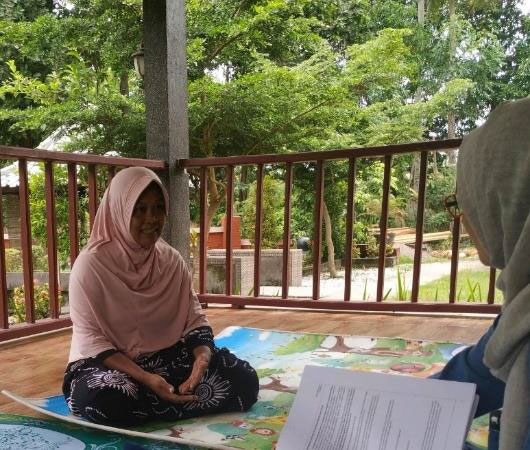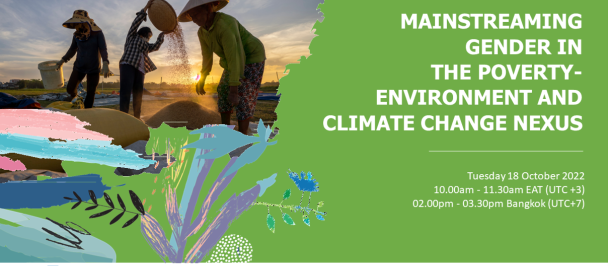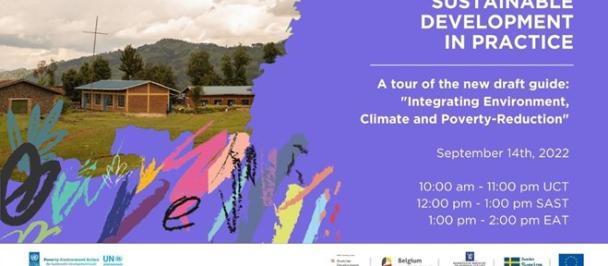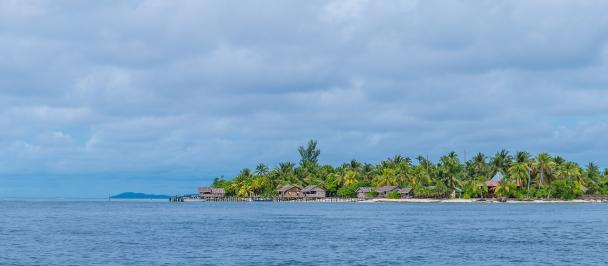Photo: UNDP
Baiq, a 40-year-old woman from Padamara Village, East Lombok, West Nusa Tenggara, shared her delight for the artesian well in her village. Constructed in 2018 by the Government of Indonesia, the well became her—and 4,449 other people of her village’s—main source of clean water when groundwater wells ran dry during the 8-month long extreme drought in 2019. Up to 19% of the village population are farmers whose very livelihood depends on water availability. Although groundwater wells exist, clean water remains scarce during prolonged droughts.
"For me personally, artesian wells are really helpful to provide us with clean water", expressed Baiq when inquired about the impact of the well.
The eastern part of Lombok is amongst the 35% of Indonesia’s territory that experienced prolonged drought in 2019. The drought in Padamara Village is just one of several examples of the recent climate crisis that has exacerbated droughts throughout the archipelagic nation. The crisis also highlights yet another challenge: it increases the burden on women and other vulnerable groups.
In the different part of Indonesia, a vegetable farmer from Central Java used to predict the weather using the Javanese calendar ‘pranata mangsa’ and it could determine when crops would need to be planted, the length of time needed for growth and the time to harvest in Desa Susukan, a village in Banjarnegara, Central Java, a district known for its lush forest and produce. But recent changes to climate patterns and the devastating loss of income, following catastrophic weather conditions, has meant women in community have struggled to sustain their livelihoods while balancing their household responsibilities. Desa Susukan, has been chosen to participate in the Ministry of Environment’s agroforestry program.
Climate change has a significant impact to communities' life particularly those who live in poverty. Women, in in this case, experience greater impact at different aspects from climate change, such as food, environment, energy, health, social, cultural and economic.1 In response to the climate crisis, the Government of Indonesia has shown its strong commitment by issuing several national policies and recently published the Climate Resilience Development Policy for 2020-2045. As part of the country’s contribution to the Paris Agreement – the Government reiterated its commitment to reduce GHG emissions by 29% with national efforts and up to 41% with international assistance against the Business-as-Usual scenario, by 2030, as stated on the Nationally Determined Contribution document.
To achieve the target, a huge amount of funding and more effective use of current resources is required. To increase transparency of public climate funding, the Ministry of Finance with support from the UNDP–UNEP Poverty-Environment Action for Sustainable Development Goals (Poverty Environment Action) initiated the Climate Budget Tagging (CBT)—as a tool to identify and track the ministries’ budget allocation for climate change activities—in 2016, which has been used ever since. Over the past five years, the average climate change budget allocation was IDR95.2 trillion/year (~USD6.8 billion/year), or 4% of the national budget per year.
Since 2016-2018, the agroforestry programme has been tagged by the Ministry of Environment and Forestry in the national planning and budgeting system, as part of mitigation activities; while, artesian well programme was initially tagged by the Ministry of Energy and Mineral Resources, as part of mitigation in 2016-2017, then it had been changed into adaptation programme in 2018. The funding from national level was distributed to sub-national level and generates positive results that show linkages between gender integration, climate change positive impacts, and the sustainability of interventions. The program also increased women’s capacity and reduced their vulnerability, through e.g., increased economic involvement, which was seen as being high prior to intervention during the particular season.
Considering the best practices, more programme on combine-theme (gender and climate change) are needed to identify gender responsive activity particularly in the planning concepts and gender responsive outputs/impacts. The Government's commitments in mainstreaming gender into the climate change are also apparent through the activities of Ministries and Institutions in conducting gender-responsive climate budgeting within the State budget. With support from Poverty-Environment Action, the Ministry of Finance and Ministry of Women Empowerment and Child Protection initiated the development of Technical Guidance for Gender Responsive Climate Budget Tagging, which will assist the technical ministries in implementing double-tagging (gender and climate change).
For more information, please visit the Poverty Environment Action initiative website.

 Locations
Locations



